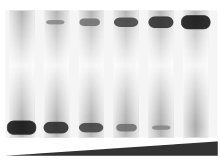

An electrophoretic mobility shift assay (EMSA) or mobility shift electrophoresis, also referred as a gel shift assay, gel mobility shift assay, band shift assay, or gel retardation assay, is a common affinity electrophoresis technique used to study protein–DNA or protein–RNA interactions. This procedure can determine if a protein or mixture of proteins is capable of binding to a given DNA or RNA sequence, and can sometimes indicate if more than one protein molecule is involved in the binding complex. Gel shift assays are often performed in vitro concurrently with DNase footprinting, primer extension, and promoter-probe experiments when studying transcription initiation, DNA gang replication, DNA repair or RNA processing and maturation, as well as pre-mRNA splicing.[1] Although precursors can be found in earlier literature, most current assays are based on methods described by Garner and Revzin [2] and Fried and Crothers.[3]
- ^ Granadino B, Penalva LO, Green MR, Valcarcel J, Sanchez L. 1997. Proc Natl Acad Sci U S A 94: 7343-8.
- ^ Garner MM, Revzin A (July 1981). "A gel electrophoresis method for quantifying the binding of proteins to specific DNA regions: application to components of the Escherichia coli lactose operon regulatory system". Nucleic Acids Res. 9 (13): 3047–60. doi:10.1093/nar/9.13.3047. PMC 327330. PMID 6269071.
- ^ Fried M, Crothers DM (December 1981). "Equilibria and kinetics of lac repressor-operator interactions by polyacrylamide gel electrophoresis". Nucleic Acids Res. 9 (23): 6505–25. doi:10.1093/nar/9.23.6505. PMC 327619. PMID 6275366.